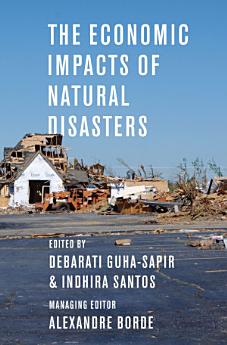The Economic Impacts of Natural Disasters
Debarati Guha-Sapir · Indhira Santos · Alexandre Borde, Managing Editor
Eph 2013 · Oxford University Press
I-Ebook
344
Amakhasi
family_home
Kufanelekile
info
reportIzilinganiso nezibuyekezo aziqinisekisiwe Funda Kabanzi
Mayelana nale ebook
Since the turn of the millennium, more than one million people have been killed and 2.3 billion others have been directly affected by natural disasters around the world. In cases like the 2010 Haiti earthquake or the 2004 Indian Ocean tsunami, these disasters have time and time again wrecked large populations and national infrastructures. While recognizing that improved rescue, evacuation, and disease control are crucial to reducing the effects of natural disasters, in the final analysis, poverty remains the main risk factor determining the long-term impact of natural hazards. Furthermore, natural disasters have themselves a tremendous impact on the poorest of the poor, who are often ill-prepared to deal with natural hazards and for whom a hurricane, an earthquake, or a drought can mean a permanent submersion in poverty. The Economic Impacts of Natural Disasters focuses on these concerns for poverty and vulnerability. Written by a collection of esteemed scholars in disaster management and sustainable development, the report provides an overview of the general trends in natural disasters and their effects by focusing on a critical analysis of different methodologies used to assess the economic impact of natural disasters. Economic Impacts presents six national case studies (Bangladesh, Vietnam, India, Nicaragua, Japan and the Netherlands) and shows how household surveys and country-level macroeconomic data can analyze and quantify the economic impact of disasters. The researchers within Economic Impacts have created path-breaking work and have opened new avenues for thinking and debate to push forward the frontiers of knowledge on economics of natural disasters.
Mayelana nomlobi
Debarati Guha-Sapir is Director of the WHO Collaborating Centre for Research on the Epidemiology of Disasters (CRED) and Professor at University of Louvain School of Public Health, Brussels. Indhira Santos is a member of The World Bank. Alexandre Borde is the Managing Director of Carbonium, a climate change and carbon finance consulting company based in Paris, France.
Nikeza le ebook isilinganiso
Sitshele ukuthi ucabangani.
Ulwazi lokufunda
Amasmathifoni namathebulethi
Faka uhlelo lokusebenza lwe-Google Play Amabhuku lwe-Android ne-iPad/iPhone. Livunyelaniswa ngokuzenzakalela ne-akhawunti yakho liphinde likuvumele ukuthi ufunde uxhunywe ku-inthanethi noma ungaxhunyiwe noma ngabe ukuphi.
Amakhompyutha aphathekayo namakhompyutha
Ungalalela ama-audiobook athengwe ku-Google Play usebenzisa isiphequluli sewebhu sekhompuyutha yakho.
Ama-eReaders namanye amadivayisi
Ukuze ufunde kumadivayisi e-e-ink afana ne-Kobo eReaders, uzodinga ukudawuniloda ifayela futhi ulidlulisele kudivayisi yakho. Landela imiyalelo Yesikhungo Sosizo eningiliziwe ukuze udlulise amafayela kuma-eReader asekelwayo.





